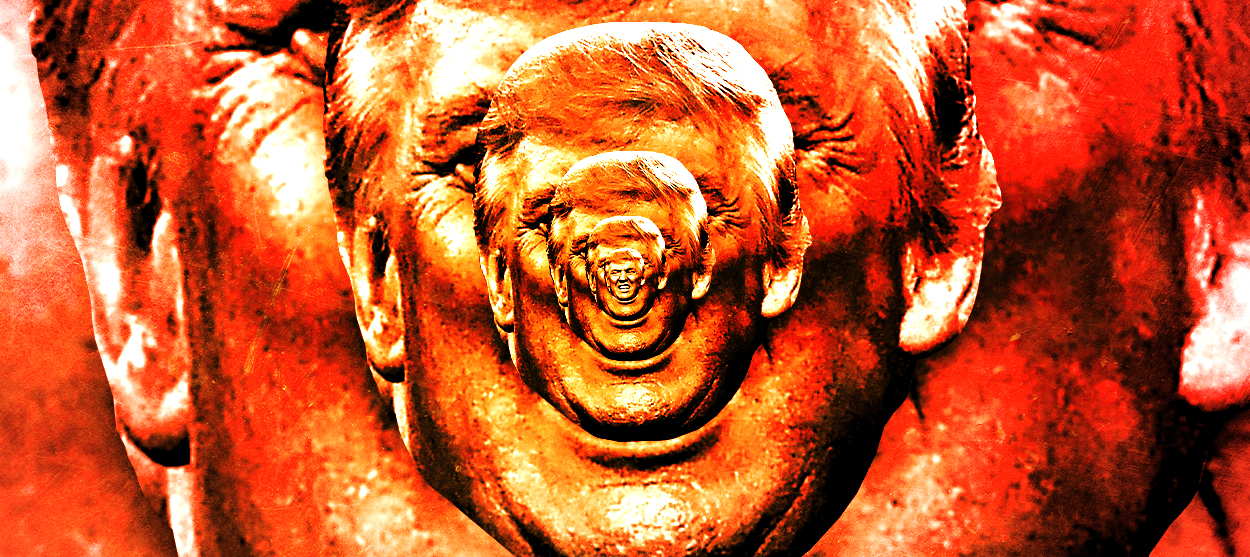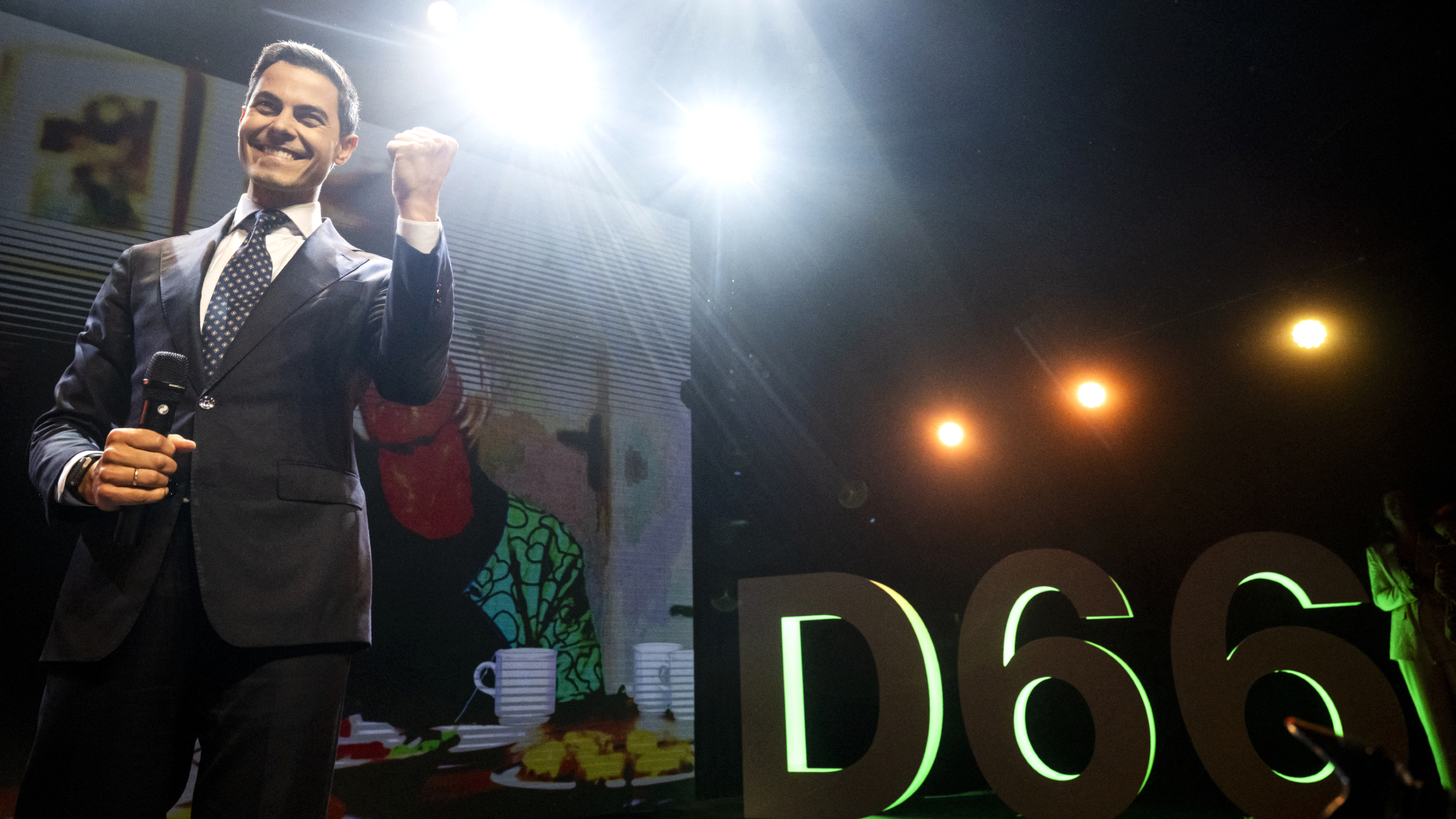My final election prediction: Reality wins
The president is not impervious to facts


A free daily email with the biggest news stories of the day – and the best features from TheWeek.com
You are now subscribed
Your newsletter sign-up was successful
The Trump era has been a deranging time — and not least because the president practices a perspectival form of politics. He talks and acts as if there is no objective truth, no common world of reality and facts out there setting the boundaries of the possible. Instead, there are only "takes" — different partisan perspectives, none of which has more or less purchase on what's happening in the world.
So, for Trump and his supporters it doesn't matter that his approval rating has been about 10 points under water for the entirety of his presidency, or that he's never once taken the lead in head-to-head national polls, or even once been within 3 points of Joe Biden, or that Biden has led in nearly every swing state, week after week, month after month. For Trump and his supporters, this is all irrelevant. It's just a mirage concocted by the president's opponents — a competing narrative that isn't truer than the account put forth by the Trump campaign.
According to the Trump campaign's alternative narrative, the proof is in the pictures. Just look at how many thousands of people are showing up for the president's rallies in swing state after swing state! Look at how many Trump supporters stopped traffic in solidly blue New York and New Jersey on Sunday afternoon with their imposing-looking trucks! Biden should be terrified! A red wave is forming!
The Week
Escape your echo chamber. Get the facts behind the news, plus analysis from multiple perspectives.

Sign up for The Week's Free Newsletters
From our morning news briefing to a weekly Good News Newsletter, get the best of The Week delivered directly to your inbox.
From our morning news briefing to a weekly Good News Newsletter, get the best of The Week delivered directly to your inbox.
Don't believe the gaslighting.
We've been bombarded by it day-in and day-out for four interminable years, with the president and his media echo chamber amplifying and repeating it endlessly. That, combined with PTSD from the outcome of the 2016 race, has left us prone to self-doubt. "Maybe it's true," we worry. "Maybe we just tell ourselves our own made-up stories. Sure, our narratives make use of reporting and polling data and math and probability theory. But why should those be more trustworthy than what we see with our own two eyes? Just look at those crowds in Pennsylvania! How could Biden possibly prevail there? It's hopeless! We're doomed!"
Yes, it's possible that Trump could win. But it isn't likely. At all. One necessary condition of him eking out a victory was the polls narrowing in the final two weeks of the race. It hasn't happened by nearly enough. Two weeks ago, Biden was up by 10.5 points in FiveThirtyEight's polling average. And now? He's up by 8.4. For comparison, on Election Day four years ago, Hillary Clinton led by 3.9 points in the final polls, less than half of Biden's lead today. (Clinton ended up beating Trump by 2.1 points in the popular vote.)
So we're expected to believe that a guy who won last time by a grand total of 80,000 votes scattered across three states when he was almost 4 points behind in national polls is now going to win when he's more than 8 points behind in national polls? Sure, that could happen. But only if Trump benefits from the most drastic, consistent, systematic error in the history of modern polling.
A free daily email with the biggest news stories of the day – and the best features from TheWeek.com
That's it. That's Trump's path to victory.
The reality of American life for the past four years is that Trump barely won the White House, it took less than a month for a majority of the country to disapprove of his presidency, and that has hardly ever changed. (For a brief period in late March and early April 2020, during a fleeting moment when it seemed like Trump was attempting to exercise leadership against the COVID-19 pandemic, his disapproval rating fell slightly below 50 percent. It took about two weeks for the numbers to revert to the norm.) The pattern is clear and incredibly consistent: A little more than two-fifths of the country laps up Trump's B.S. like it's a gourmet meal. But a solid, consistent majority opposes him and wants to kick him out of the people's house.
That isn't a "take." That isn't a "narrative." That isn't a "story." It's a fact.
Yes, Trump can get several thousand people to show up for a rally, just as if you live in a very pro-Trump area you may see nothing but Trump yard signs and encounter people who think Biden's a senile socialist who smiles every time a riot breaks out in an American city. In my neighborhood in suburban Philadelphia, I see Biden signs in every direction. That doesn't mean he's going to win 98 percent of the popular vote. It's a big country! My perspective is severely limited, as is that of any particular voter in any particular place. I live in a pro-Biden area. But if I drive ten minutes further out from the city, I'll see a mixture of Biden and Trump signs. If I go a half-hour further, the Trump signs will dominate. None of this can be taken as determinative about the overall results in Pennsylvania or in the country as a whole.
That doesn't mean we're epistemologically at sea, or blindly groping around in the dark. We can know things about the world. The sun appears to circle the Earth, but by combining observation with mathematical calculations, we can know that in fact that Earth circles the sun. Likewise, by polling the American electorate, we can know more than we would if we simply relied on our senses, hopes, wishes, and fears. And on that basis, we have every reason to think — based on a mountain of redundant evidence — that significantly more Americans want Trump to lose than want him to win re-election.
That's real. As real as the knowledge that the United States has not "turned the corner" on the COVID-19 pandemic, no matter how many times the president repeats the lie, and no matter how loudly crowds applaud it. We know this because more and more Americans are testing positive for the virus every day, because hospitalizations are rising, and because daily deaths from the virus (a lagging indicator) have begun to rise as well. Our senses don't tell us this, and neither does our individual experience. We know it because we live in a civilization that keeps track of things, that aspires to understand the truth about what's really happening in the world, and we get slowly better at both over time, even if we make plenty of mistakes and often judge badly when our own interests are at stake.
Whatever the final outcome of the election, we need to remember one thing above all others: Reality is what it is, and it doesn't care one bit about what you want to be true. We either devote our lives to living in the world as it is or we flee into fantasy.
Those are the options, and that is the ultimate choice before us.
Damon Linker is a senior correspondent at TheWeek.com. He is also a former contributing editor at The New Republic and the author of The Theocons and The Religious Test.
-
 The ‘ravenous’ demand for Cornish minerals
The ‘ravenous’ demand for Cornish mineralsUnder the Radar Growing need for critical minerals to power tech has intensified ‘appetite’ for lithium, which could be a ‘huge boon’ for local economy
-
 Why are election experts taking Trump’s midterm threats seriously?
Why are election experts taking Trump’s midterm threats seriously?IN THE SPOTLIGHT As the president muses about polling place deployments and a centralized electoral system aimed at one-party control, lawmakers are taking this administration at its word
-
 ‘Restaurateurs have become millionaires’
‘Restaurateurs have become millionaires’Instant Opinion Opinion, comment and editorials of the day
-
 ‘Poor time management isn’t just an inconvenience’
‘Poor time management isn’t just an inconvenience’Instant Opinion Opinion, comment and editorials of the day
-
 Kurt Olsen: Trump’s ‘Stop the Steal’ lawyer playing a major White House role
Kurt Olsen: Trump’s ‘Stop the Steal’ lawyer playing a major White House roleIn the Spotlight Olsen reportedly has access to significant US intelligence
-
 Japan’s Takaichi cements power with snap election win
Japan’s Takaichi cements power with snap election winSpeed Read President Donald Trump congratulated the conservative prime minister
-
 How realistic is the Democratic plan to retake the Senate this year?
How realistic is the Democratic plan to retake the Senate this year?TODAY’S BIG QUESTION Schumer is growing bullish on his party’s odds in November — is it typical partisan optimism, or something more?
-
 The billionaires’ wealth tax: a catastrophe for California?
The billionaires’ wealth tax: a catastrophe for California?Talking Point Peter Thiel and Larry Page preparing to change state residency
-
 Bari Weiss’ ‘60 Minutes’ scandal is about more than one report
Bari Weiss’ ‘60 Minutes’ scandal is about more than one reportIN THE SPOTLIGHT By blocking an approved segment on a controversial prison holding US deportees in El Salvador, the editor-in-chief of CBS News has become the main story
-
 Has Zohran Mamdani shown the Democrats how to win again?
Has Zohran Mamdani shown the Democrats how to win again?Today’s Big Question New York City mayoral election touted as victory for left-wing populists but moderate centrist wins elsewhere present more complex path for Democratic Party
-
 Dutch center-left rises in election as far-right falls
Dutch center-left rises in election as far-right fallsSpeed Read The country’s other parties have ruled against forming a coalition
